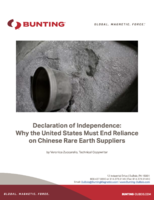EPA proposes changes to enhance confidence in RIN trading.
Share:
Press Release Summary:
To help make Renewable Fuel Standard program more effective, EPA is proposing structured process for buyers of Renewable Identification Numbers to verify validity. Under proposal, RINs would be verified through voluntary quality assurance program that also includes alternative compliance options which leverage existing industry practices and market forces. QAPs would provide means for independent third parties to audit production of renewable fuel and verify that RINs have been validly generated.
Original Press Release:
EPA Proposes Changes to Enhance Confidence in RIN Trading in the RFS Program
WASHINGTON -To help make the Renewable Fuel Standard (RFS) program more efficient and effective the U.S. Environmental Protection Agency (EPA) is proposing a structured process for buyers of Renewable Identification Numbers (RINs) in order to verify their validity.
Under the proposal, RINs would be verified through a new voluntary quality assurance program that also includes alternative compliance options which leverage existing industry practices and market forces. This proposal will be available for a 30-day public comment period. EPA will consider feedback from a range of stakeholders before the proposal is finalized.
Quality Assurance Plans (QAPs) would provide a recognized means for independent third parties to audit the production of renewable fuel and verify that RINs have been validly generated.
For RINs that have been verified according to an approved QAP, the program would provide protection against liability for civil violations resulting from the transfer or use of invalidly generated RINs under certain conditions. The rule would also specify both the conditions under which invalid RINs must be replaced with valid RINs, and by whom. The proposed rule allows verification of RINs to begin this year.
The RFS program, which was established under the Energy Policy Act of 2005 and later modified through the Energy Independence and Security Act of 2007, requires that specified volumes of renewable fuel be used as transportation fuel, home heating oil, and/or jet fuel each year.
Renewable fuel producers and importers generate RINs based on the volume of compliant renewable fuel that they make available. RINs can then be traded and used by petroleum refiners and importers (“obligated parties”) to show compliance with their volume obligations.
Following a number of high profile RIN fraud cases, EPA expects its rulemaking to improve the overall liquidity in the RIN market and in particular make it easier for smaller renewable fuel producers to sell their RINs. EPA worked closely with stakeholders in developing the proposal.
More information on the proposed rule and the RFS program: http://epa.gov/otaq/fuels/renewablefuels/regulations.htm




